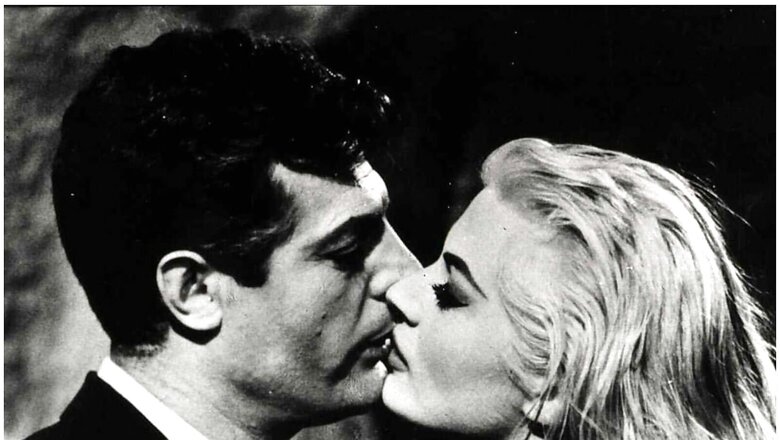
views
Cannes and controversy are as inseparable as Siamese twins. In its early years, the Film Festival that now races towards its 75th anniversary (May 17-28), was shame and scandal on the beach. Once an American starlet dropped her top and rushed to a leading Hollywood hero who had to quickly save her modesty with his palms! And all this for moments of photo-op when she hoped to catch some producer’s or director’s eye. With young women stripping to their panties and inviting lensmen to capture their naked glory and others playing, yes playing, basket ball on the beach in their topless allure, there was never an unexciting moment on the French Riviera.
Well, somewhere the Festival, often called – and rightly so – the Queen of All, grew tired of this toplessness and shifted its focus to movies, which also created huge controversies. A run through some of them, and they came with dollops of daring sex and gut-wrenching violence.
One of the earliest titles that raised eyebrows was Italian master Federico Fellini’s La Dolce Vita, which came to the Croisette (Cannes’ beach front) in 1960 bundled with questions. The film’s immoral pleasures had already angered the Vatican, which in that era was unimaginably conservative. Even La Dolce Vita’s opening shot of a helicopter carrying the statue of Christ over Rome got the church infuriated. But the film became a hot debating point at Cannes, and Cannes being Cannes sent the film away with the highest honour, Palm d’Or.
Another movie that despite its raw violence took the Palm d’Or was Martin Scorsese’s Taxi Driver (1976), which showed a wounded Vietnam soldier (Robert De Niro) swathed in blood. That year’s President of the jury, Tennessee Williams, was openly critical. “Watching violence on the screen is a brutalising experience for the spectator,” he told the Press. “Films should not take a voluptuous pleasure in lingering on terrible cruelties as though one were at a Roman circus.” Yet, the jury could not ignore the movie’s artistic high and gave it the highest honour.
Nobody imagined that Quentin Tarantino’s Pulp Fiction in 1994 with its blood and gore would garner the Palm d’Or. Even the director had said that he did not make the kind of films which brought people together. “I make the kinds of movies that split people apart.” The crime epic was a subject of hot discussion. And just about everybody had imagined and even hoped that Krzysztof Kieślowski’s romantic mystery, Three Colours: Red, would clinch the statue, because of its sweet traditional cinematic appeal. But no. It did not, with the trophy going to Tarantino.
In 1996, David Cronenberg’s Crash, which was a cocktail of sex and violence that got men and women turned on with its horrific car crashes, was booed and jeered, and the media hammered the film to pulp. The Evening Standard wrote: “Some of the most perverted acts and theories of sexual deviance…ever seen propagated in mainline cinema was seen”. The jury President, Francis Ford Coppola, was dead against Crash. Although Mike Leigh’s Secrets and Lies got the Palm, the panel members prevailed to honour Cronenberg with a Special Jury Award.
The 2001 Festival witnessed a terrible scene when the young actors playing in Michael Winterbottom’s 24 Hour People armed themselves with dead pigeons and began attacking one another in a case of life imitating art. But when the birds landed on diners at the plush Majestic Restaurant, security guys had to step in – even as Mr Director watched the whole “show” with gleeful exuberance.
The following year, Gaspar Noe’s wild Irreversible had a nine-minute raw rape scene in what was one man’s search for revenge against the guy who had misbehaved with his girlfriend. About 200 people in the audience walked out in disgust and some 20 of them needed medical assistance when they fainted! “In 25 years in my job, I’ve never seen this at the Cannes Festival,” a fire-brigade spokesman told the BBC. “The scenes were unbearable, even for us professionals.” It starred Vincent Cassel and Monica Bellucci.
Cannes did a hat-trick; in 2003, it featured The Brown Bunny by Vincent Gallo. His co-star Chloe Sevigny performed unsimulated oral sex on him. The work was panned and damned by critics and viewers.
We all know the kind of controversy Danish director Lars Von Trier can create. In 2011, at Cannes to present Melancholia, he told a crowded media conference that he admired Hitler. The Festival found itself on fire and was forced to ask him to leave the city. Even his 2009 Antichrist was panned because of its misogyny. Yet, its actress, Charlotte Gainsbourg, was adjudged Best Actress.
As recent as 2019, Mektoub My Love, Intermezzo by Abdellatif Kechiche had long scenes of sex that were unsimulated. The movie features a scene in which actress Ophelie Bau receives oral sex and is brought to orgasm.
As they say, Cannes never has a dull moment, and let us see what is on offer this time.
Read all the Latest Movies News here

















Comments
0 comment